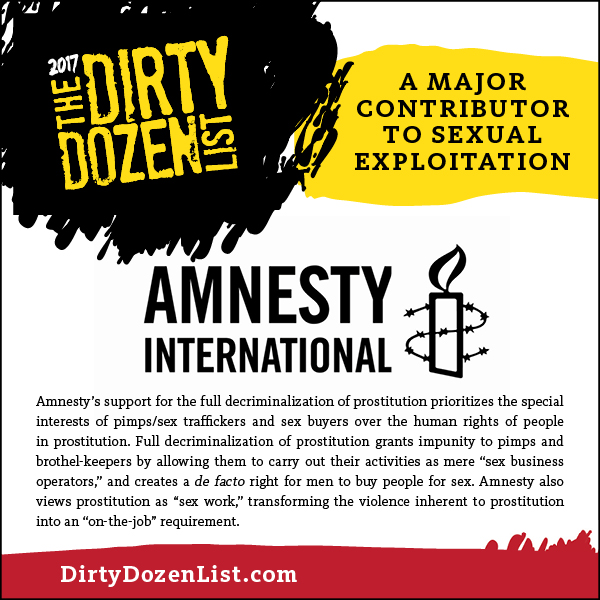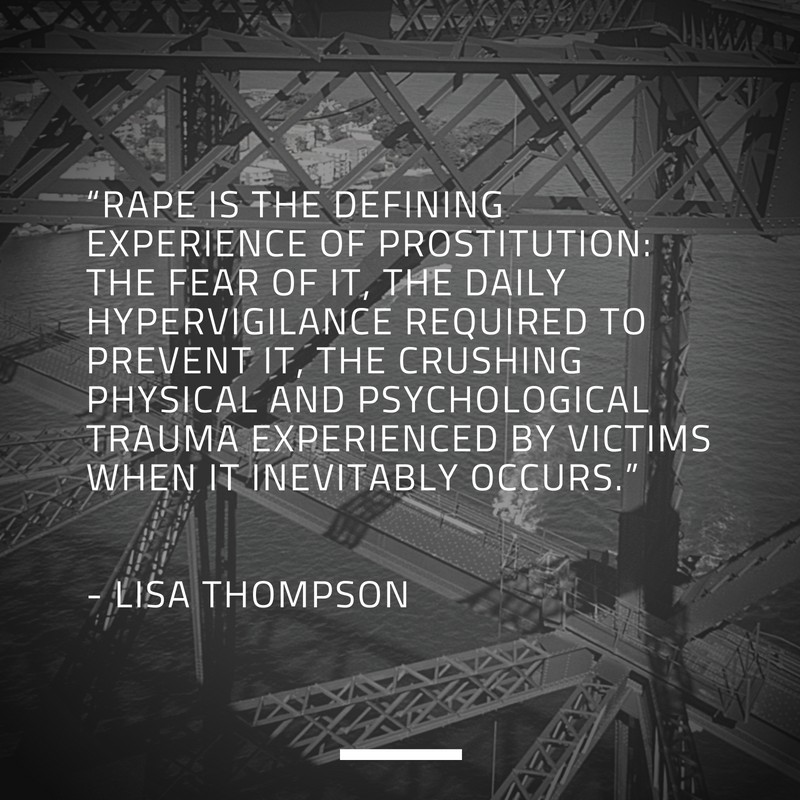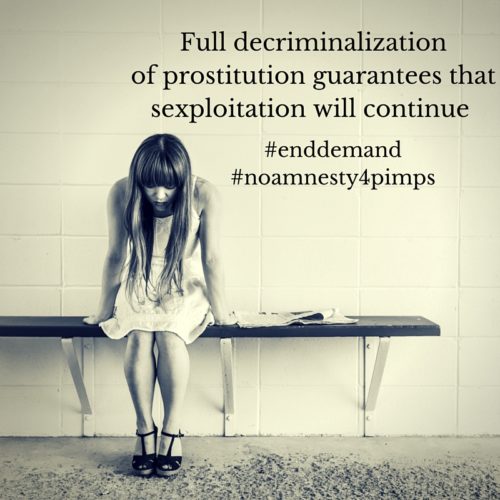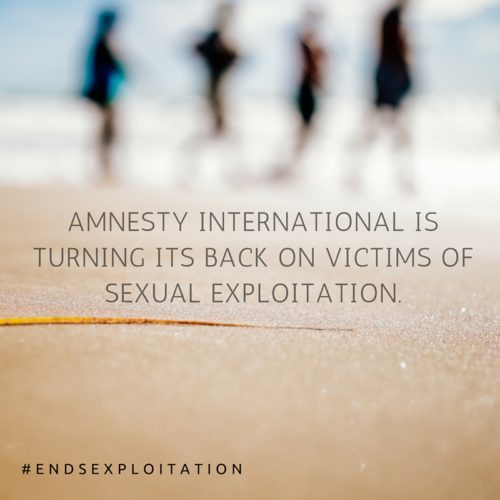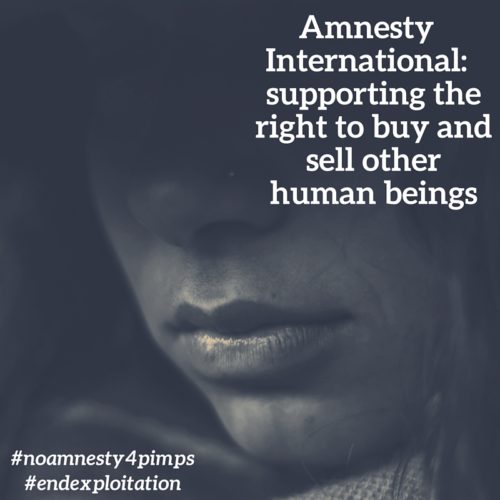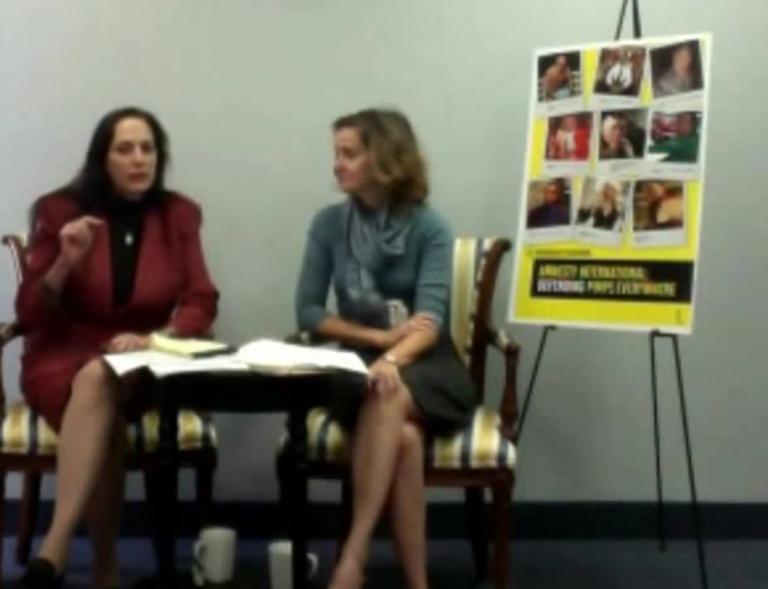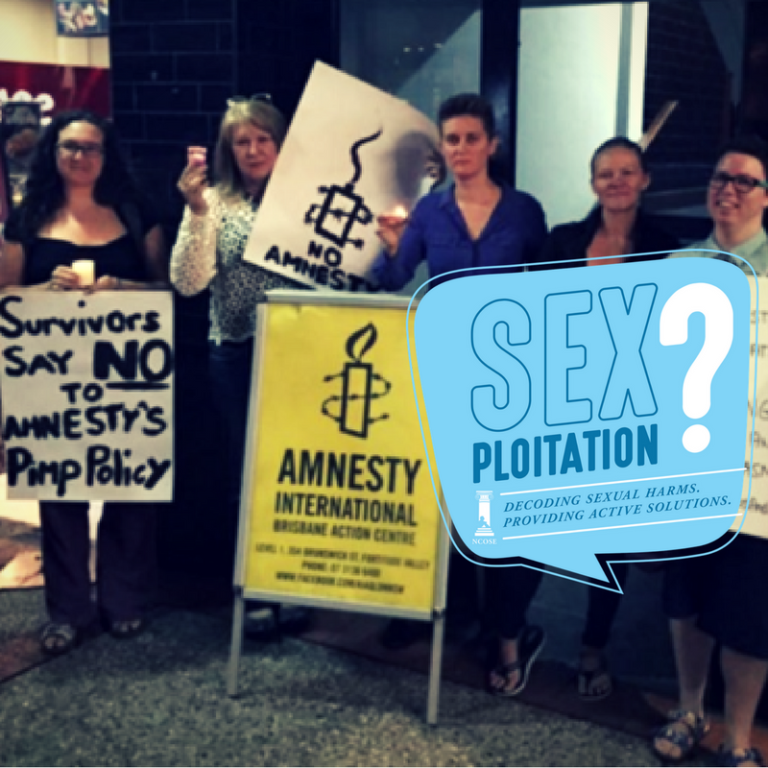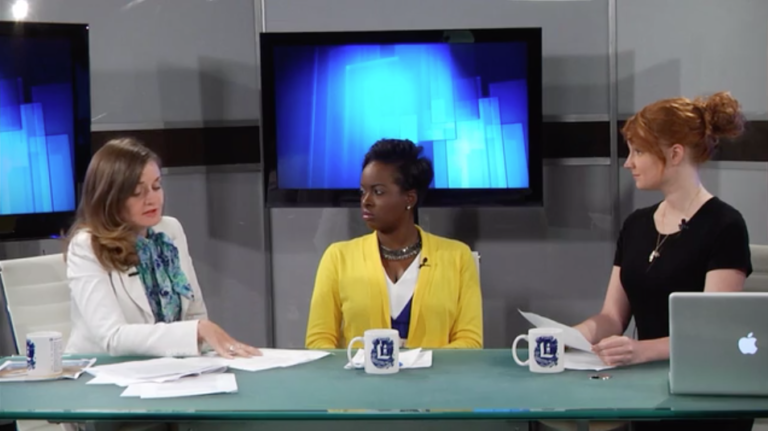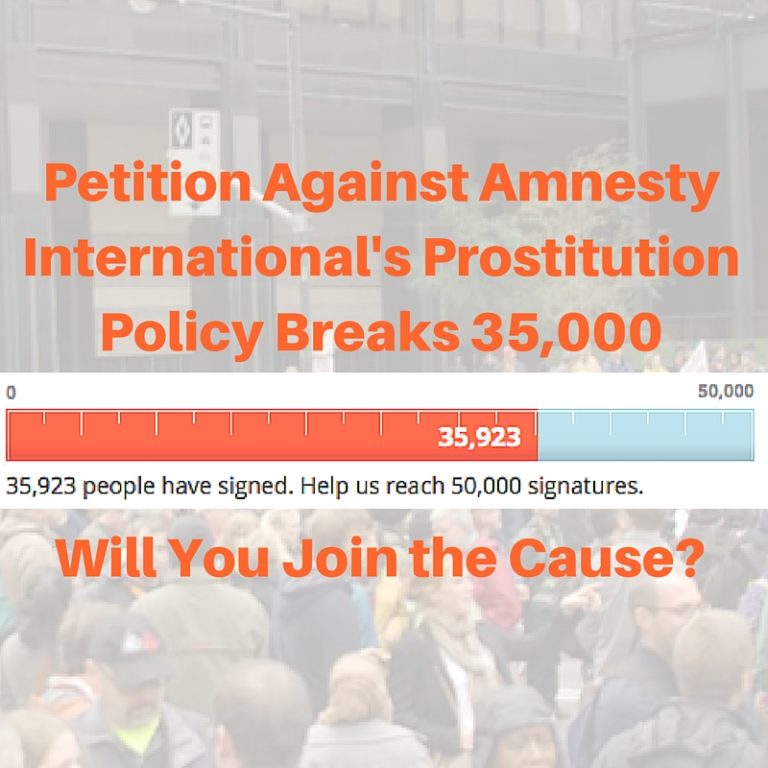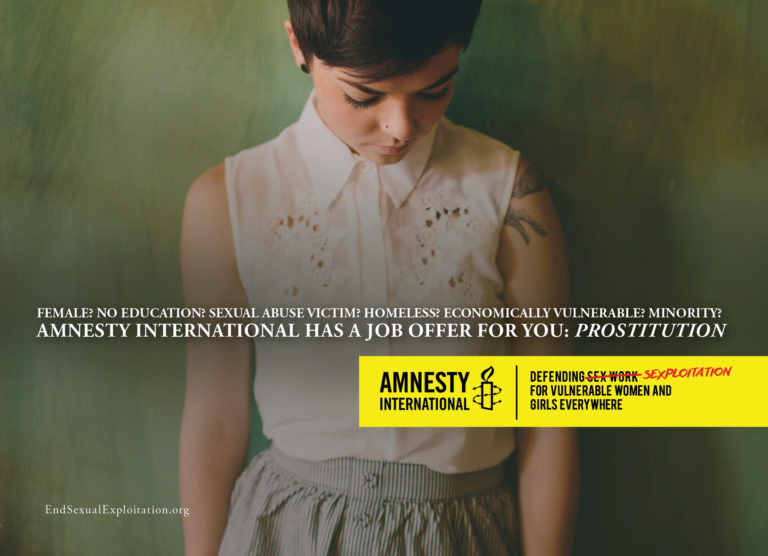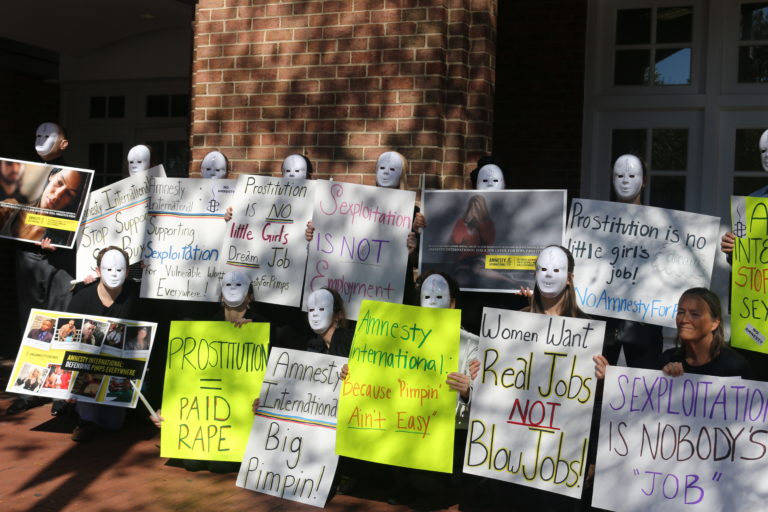
The Problem
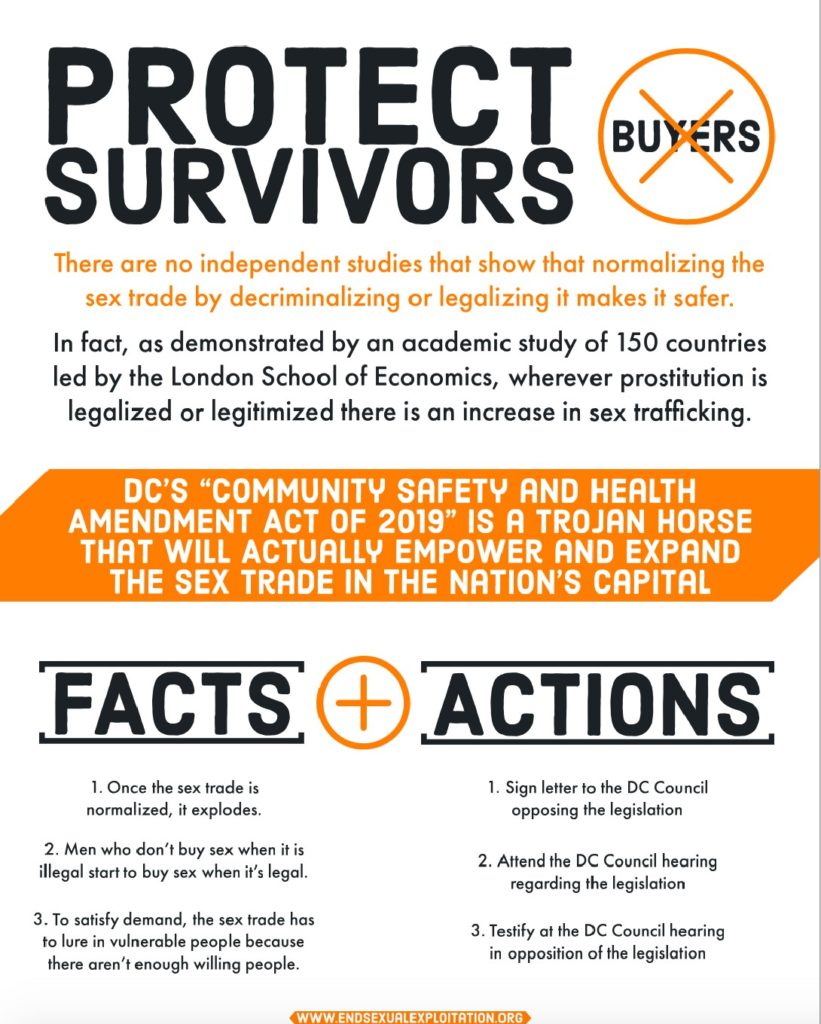
As a matter of both human rights and human dignity, we oppose the commodification of people as objects to sell for sex. Regardless of whether it is regulated or fully decriminalized, prostitution is the organized system whereby human beings are used as public sexual commodities. The sexual exploitation of individuals within this system results in inescapable physical, psychological, and emotional trauma.
Two approaches to prostitution law commonly referred to as legalization and full decriminalization, while distinct from each other, advance the same agenda, namely that: 1) Men should be able to buy and control the bodies of women, men, and transgender persons; and 2) Others should be able to control and profit from the merchandising of people for sex. Both approaches —legalized and fully decriminalized prostitution—unleash the demand for paid sex which, in turn, fuel sexual exploitation, and trafficking and redefine pimping/sex trafficking as an entrepreneurial activity. Thus, both approaches create market-based “on-ramps” to sexual exploitation.
Across the United States, political efforts to normalize the commercial sex industry are popping up, often claiming to protect people in prostitution. Pending before the District of Colombia’s city council, for example, is a bill with the Orwellian title Community Safety and Health Amendment Act of 2019.
Urgent DC Action Needed (2019)
[This urgent action was from 2019, so the details and links might be out-of-date]
DC’s “Community Safety and Health Amendment Act of 2019”: A Trojan Horse Empowering and Expanding the Sex Trade in the Nation’s Capital
Under the guise of improving “community safety and health,” DC Councilmembers David Grosso, Anita Bonds, Brianne Nadeau, and Robert White have put forward the above-referenced bill (23-0318) which, if passed, will amend existing DC statutes to fully decriminalize and deregulate prostitution in the nation’s capital. The proposed bill seeks to decriminalize pimps, brothel-keeping, and sex buyers (i.e., those who “rent” sexual access to the bodies of others). Don’t let the lofty-sounding title of this bill fool you. It is a Trojan horse empowering organizers of sexual exploitation—pimps (i.e. sex traffickers) and brothel keepers—as well as serving the interests of sex buyers.
What the Bill Actually Does (More Details Here)
- Decriminalizes “Pimping” – This bill would become lawful to engage in the sale of other human beings, or one’s self, for sex.
- Decriminalizes Brothel Keeping – This bill would make the operation of brothels not only legal but entirely unregulated.
- Decriminalizes Sex Buying – This bill would decriminalize “soliciting for prostitution” and would, therefore, decriminalize not only those who are sold for sex but also the sex buyers.
What You Can Do
- Attend the upcoming DC Council Judiciary Committee hearing on this bill, scheduled to begin at 10:00 AM on Oct 17, at the WilsonBuilding (1350 Pennsylvania Ave, NW, Washington, DC) in room 412. Ask friends to join you.
- Request to offer 5 minute testimony in opposition to the bill. Sign up to testify by emailing the Judiciary Committee at judiciary@dccouncil.us. In your email, you must provide your name, telephone number, organizational affiliation, and title (if any) by the close of business on Monday, October 14th.
- DC-based organizations and DC residents can sign on to this letter opposing the full decriminalization legislation
What Decriminalization of Prostitution Does
Creates On-Ramps to Psychological Trauma
Prostitution is an organized system whereby human beings are provided and used as public sexual commodities. The sexual exploitation of individuals within this system is fueled by those who choose to buy other human beings for sex. This activity results in inescapable physical, psychological, and emotional trauma. Decriminalization of pimps, brothel-keeping, and sex buyers does not prevent the high rates of post-traumatic stress disorder, depression, and other psychological and emotional harms associated with prostitution, but ensures such harms are perpetuated and multiplied. Decriminalization of pimping and sex buying creates major on-ramps to sexual exploitation by unleashing the demand for commercial sex.
Unleashes Demand
The demand for people to be used for sex is the reason prostitution and sex trafficking exist. Available evidence demonstrates this behavior as being almost entirely engaged in by males.[1] Once sex buying is decriminalized, it explodes, because men who don’t buy sex when it is illegal fearing potential criminal consequences become new consumers when legal barriers are removed. As a 2018 study of 8,000 American men demonstrate, more than 20% of respondents who never bought sex would if it was decriminalized. In Germany, where prostitution and brothels have been legal since 2002, an estimated one million men buy sex each day. Berlin alone has more than 500 brothels.[2] Moreover, sex trafficking cases in Germany increased by 70% between the years 2005-2009 as a result of legalization.[3]
Empowers a Predatory System Exploiting the Vulnerable
To satisfy the demand, the sex trade must lure in vulnerable people, because there are never enough people “available” for prostitution. In a world where homeless persons, sexual abuse victims, foster care children, immigrant and indigenous women, refugees, persons of color, learning disabled, and transgender persons already suffer from lives of political, social, and economic marginalization, it is a travesty of justice to decriminalize those who take pleasure in and literally profit from their sexual exploitation. But full decriminalization of prostitution assents to the sexual exploitation and trafficking of marginalized persons, often based on the false belief that systems of prostitution can be “fixed,” or the dystopian view that prostitution is a “social security” substitute for the poor and disenfranchised. No one should ever be expected to allow men access to their bodily orifices—mouth, vagina, and rectum—in order to obtain shelter, healthcare, social services or to feed themselves and their children.
The real objective of full decriminalization is an unregulated prostitution marketplace, where people can be sexually exploited with impunity.
Importantly, when NCOSE decries prostitution, we are condemning prostitution as a system whereby human beings are openly bought and sold for sex, not the persons used and exploited by that system.
Intersectionality of Prostitution with Sexual Violence
Intersectionality of Prostitution with Sexual Violence and Vulnerabilities
Studies characterize the violence that animates prostitution as brutal,[i] extreme,[ii] common,[iii] startling,[iv] normative,[v] and ever-present.[vi] Indeed, physical and sexual violence across prostitution types is pervasive—whether one is prostituting in Dallas, Texas,[vii] or Lyon County, Nevada,[viii] indoors or outdoors, online,[ix] for drugs or to pay the rent—both the threat of, as well as actual violence, permeate the everyday experience of prostitution.[x] Prostitution is so intertwined with exploitation, harm, and trauma, it can never be viewed as a conventional “business.”[xi] There is no such thing as “safe” prostitution.
In a world where so many homeless persons, sexual abuse victims, foster care children, immigrant and indigenous women, refugees, persons of color, learning disabled, and transgender persons already suffer from lives of political, social, and economic marginalization, it is a travesty of justice to decriminalize those who take pleasure in and literally profit from their sexual exploitation. But this is exactly what legalization and full decriminalization of prostitution does—it assents to the sexual exploitation and trafficking of marginalized persons, often based on the false belief that systems of prostitution can be “fixed” by legalization or full decriminalization, or the dystopian view that prostitution is a “social security” substitute for the poor and disenfranchised.
Yet, no amount of regulation can prevent the high rates of post-traumatic stress disorder, depression, and other psychological and emotional harms associated with prostitution. And, no one should ever be expected to give men access to their bodily orifices—mouth, vagina, and rectum—in order to obtain shelter, healthcare, social services or to feed themselves and their children.
[i] Celia Williamson and Gail Folaron, “Violence, Risk, and Survival Strategies of Street Prostitution,” Western Journal of Nursing Research 23, no. 5 (2001): 463-475; Jody Miller and Martin Schwartz, “Rape Myths and Violence against Street Prostitutes,” Deviant Behavior: An Interdisciplinary Journal, 16 (1995): 1–23.
[ii] Melissa Farley, Jacqueline Lynne, and Ann Cotton, “Prostitution in Vancouver: Violence and the Colonization of First Nations Women,” Transcultural Psychiatry 42, no. 2, (2005): 242–271; Jody Raphael and Deborah L. Shapiro, “Sisters Speak Out: The Lives and Needs of Prostituted Women in Chicago, A Research Study,” (Center for Impact Research, Chicago, Illinois, 2002).
[iii] Melissa Farley, “Prostitution, Trafficking, and Cultural Amnesia: What We Must Not Know in Order To Keep the Business of Sexual Exploitation Running Smoothly,” Yale Journal of Law and Feminism 18, (2006): 101–136; Celia Williamson and Gail Folaron, “Violence, Risk, and Survival Strategies of Street Prostitution,” Western Journal of Nursing Research 23, no. 5 (2001): 463–475.
[iv] Kendra Nixon, Leslie Tutty, Pamela Downe, Kelly Gorkoff, and Jane Ursel, “The Everyday Occurrence: Violence in the Lives of Girls Exploited through Prostitution,” Violence against Women 8, no. 9 (September 2002): 1016–1043.
[v] Farley, “Prostitution, Trafficking, and Cultural Amnesia,” ibid.
[vi] Geetha Suresh, L. Allen Furr, and Aylur Kailasom Srikrishnan, “An Assessment of the Mental Health of Street-based Sex Workers in Chennai, India, Journal of Contemporary Criminal Justice 25, no. 2 (2009): 186-201; Jody Miller and Martin Schwartz, “Rape Myths and Violence against Street Prostitutes,” Deviant Behavior: An Interdisciplinary Journal, 16 (1995): 1–23.
[vii] Tasha Tsiaperas and Claire Ballor, “Killer Who Burned His Backpage Date in ‘World’s Worst Attempt’ at Coverup Gets 60 Years in Prison,” Dallasnews.com, February 1, 2018, dallasnews.com/news/crime/2018/02/01/richardson-man-guilty-killing-backpage-date-worlds-worst-attempt-destroying-evidence (accessed April 9, 2019).
[viii] Rebekah Charleston vs. State of Nevada, (February 2, 2019), devncose.wpengine.com/wp-content/uploads/DKT-No.-1.-2019.02.25.-Complaint.6.pdf (accessed April 9, 2019).
[ix] Legal Momentum and I am Jane Doe, “Backpage, Craigslist, Dating App – Murder List” February 2018, devncose.wpengine.com/wp-content/uploads/Backpage_MURDER-MAP_2018_REFORMAT-1.pdf.
[x] Lisa L. Thompson, “Prostituted and Sexually Trafficked Persons are Rape Victims, Too” SANE-SART Online + Clinical, (March 24, 2016), sane-sart.com/prostituted-and-sexually-trafficked-persons-are-rape-victims-too/ (April 9, 2019).
[xi] Demand Abolition, Who Buys Sex? Understanding and Disrupting Illicit Market Demand, (November 2018), demandabolition.org/research/evidence-against-legalizing-prostitution (accessed March 31, 2019).
NCOSE's Requests for Change
We Stand for the Abolition of Sexual Exploitation
This is why we stand for abolition—legal approaches to prostitution which seek to eradicate male sexual entitlement to the bodies of others through strong penalties, and which provide robust social services to those caught up in organized systems of sexual exploitation to support their exit from the sex trade. For strong policy recommendations that advance these goals, we recommend to you the report by Demand Abolition entitled Who Buys Sex? Understanding and Disrupting Illicit Market Demand.
Its recommendations are:
- Move law enforcement’s finite resources away from arresting and adjudicating prostituted persons and towards arresting and adjudicating buyers.
- Make available short-term federal funding programs to support state and local agencies ready to instigate reforms.
- Use mandatory minimum fines from convicted buyers to offset the costs of survivor exit services and law enforcement operations to stop demand.
- Create increasingly severe penalty structures for repeat buyers, ensuring that sanctions are fair and consistent with survivor testimony of the nature of victim impact.
- Counter messages that normalize sex buying through educational and public health interventions.
- Establish employer policies prohibiting sex buying under any circumstances, including activities on company time or with company resources that are related to sex buying.
- Implement targeted prevention campaigns and focus deterrence communications on behavioral “nudges.”
Research & FAQ's
What is decriminalized prostitution? Is it different from legalized prostitution?
Decriminalized prostitution refers to the removal of laws criminalizing the sex trade. One form of decriminalization—commonly referred to as the Nordic model—targets only individuals involved in the selling of sex (i.e. prostituting persons); other forms of decriminalization may seek to decriminalize all parties involved in the provisioning, buying, and selling of sex. Thus, “full” decriminalization refers to the repeal of laws pertaining to pimping, brothel keeping, and sex buyers, as well as those who sell sex.
Legalized prostitution is generally understood to be regulated prostitution, although the term may also be used to refer to jurisdictions where there is no law explicitly prohibiting prostitution. Under systems of legalized prostitution, various regulations governing how commercial sex transaction are to be conducted are instituted. Such regulations may include brothel licensing requirements and restrictions on where brothels can locate, as well as establish requirements that prostituting persons officially register with the government, undergo compulsory health checks, and pay taxes on proceeds from prostitution.
A third approach to prostitution is known as prohibition. According to this approach all prostitution is viewed as criminal activity and all activities connected with prostitution (i.e. soliciting, procuring, pimping, brothel keeping) are criminalized.
What’s the problem with decriminalization of prostitution?
Across the United States, political efforts to normalize the commercial sex industry are popping up, often claiming to protect people in prostitution.
However, the reality is: There are no independent studies that show normalizing the sex trade by decriminalizing it or legalizing it makes it safer.
On the contrary, where prostitution is legalized/legitimized there’s an increase in sex trafficking, as demonstrated by an academic study of 150 countries led by the London School of Economics.
Why? For several logical reasons:
- Once you normalize the sex trade, it explodes. In Germany, where prostitution and brothels have been legal since 2002, an estimated one million men buy sex each day, coming from all over the world. The capital city, Berlin, alone has over 500 brothels.
- Men who don’t buy sex when it is illegal, become new clients. As a 2018 study of 8,000 U.S. men demonstrates, over 20% of respondents who never bought sex, would consider engaging in exploitation if it was decriminalized or legalized.
- To satisfy demand, the sex trade has to lure in vulnerable people, because there are never enough women willing to be exploited and degraded in prostitution
Sex trafficking cases increased 70% in Germany as a result of legalization.
In The Netherlands were prostitution was legalized in 2000, an estimated 50-90% of women are selling their bodies against their will.
The illegal sex trade increases alongside the legal sector, when it is normalized.
Nevada, the only U.S. jurisdiction with legal brothels, has the highest rates of an illegal sex trade—63% higher than the next highest state of New York and double that of Florida.
Prostitution is inherently dangerous and harmful. The only way to protect people is to shrink the market.
A 2018 study of prostituted women, including trans women, in the U.S. found 61% suffered Traumatic Brain Injuries while in “the Life.”
In a nine-country study of 785 prostituted women, 68% suffered PTSD at same severity as combat veterans and victims of state torture.
The mortality rate of women in prostitution is 200 times the rate of the general population, according to a Colorado medical study examining two decades of evidence.
In an academic survey of women, including trans women, in DC engaged in street prostitution, 42% met the criteria for PTSD, 61% percent reported being physically assaulted, nearly 80% reported being threatened with a weapon, and 44% had been raped in prostitution, with 60% of these rapes committed by sex buyers.
What happened in areas where prostitution has been decriminalized or legalized?
A 2013 study of 150 countries from the London School of Economics found that wherever prostitution was legal, sex-trafficking tended to increase, not decrease.
Further, the state of Nevada (the only state in the U.S. with legalized prostitution in select counties) has the highest rates of an illegal sex trade in the country, adjusted for population. It is 63% higher than the next highest state of New York and double that of California.
Why? Because once something is legal, there is an increased demand for it.
And because prostitution is inherently dangerous and harmful, there are not many women or men who enter into it “willingly.” This means that sex traffickers push victims into the sex trade through force, fraud, or coercion in order to make a profit off of the high demand for commercial sex.
It is essentially impossible for sex buyers to vet and know if the person they are purchasing for sex is a sex trafficking victim or not. Most sex trafficking victims are not held in dungeons with literal chains but are instead imprisoned through psychological coercion and threats, so that they can meet sex buyers at various locations.
What’s the problem with prostitution as long as it’s freely chosen?
The debate about choice in prostitution is always focused on those with the least power and control in the whole equation: the prostituting person. It’s time to discuss the choices of those with the real power—sex buyers, pimps, corporate interests, and governments—and hold them accountable for their choices to promote and participate in sexploitation.
If for nothing else, America is known for the bonanza of choices it presents to those living within its borders, and the freedom it extends to those individuals to pursue them. From the trivial, like what kind of milk (i.e. skim, 1%, 2%, whole, dairy, almond, soy, and a wide assortment of blends) and coffee we drink (ice mocha latte with a shot of espresso, anyone?), to the serious, like the occupations we pursue and those we elect—and everything in between—America affords its residents a cornucopia of choices. Indeed, choice and freedom are viewed by many as part of the American birthright.
In this context, supreme value is placed on the ability to choose, but not on what is chosen. As long as a perception of the freedom to choose exists, most people are happy to let others pursue whatever course they will. However, this “it’s your choice” approach to life, is not without its downsides. Just ask any recently divorced person who was traded in for someone younger and hotter how they feel about their ex-spouse’s choice to move on. Or consider the lives being lost because of the new wingsuiting craze that has motivated people to jump off mountains to experience “flying” but who tragically plummeted to their deaths. Clearly, then, not all choices are created equal.
This is especially true of prostitution. But, ask anyone involved in advocacy efforts or providing social services on behalf of prostituted persons, and they will tell you about the all-too-familiar, pro-prostitution, trump card otherwise known as “the choice argument.” It usually goes down like this: whenever a debate about prostitution arises, pro-prostitution advocates play their “choice card” by raising an argument which asserts that as long as prostitution is chosen, it no longer constitutes exploitation. Any harms that result are just the cost of poor decision making and the full responsibility of the person making the choice. The intended result is to shut down any arguments about the harms, the violence, the inequality, and dehumanization that are all part and parcel of prostitution. After all, to be anti-choice is to be anti-freedom, a proponent of oppression, and an unreasonable puritan, right? Without doubt it’s been a powerful tactic, but let’s examine the claim more carefully.
According to this view, no matter how injurious, dangerous, or pernicious the choice to prostitute may be, we must simply sit back and accept prostitution as a fact of life—as long as it is chosen. But as author and women’s advocate Rebecca Whisnant explains, “That something is chosen or consensual is perfectly consistent with its being seriously oppressive, abusive, and harmful—to oneself and/or to a broader group of which one is a member (e.g. women).” We wholeheartedly agree.
There are lots of choices one can make: to jaywalk, eat foods loaded with trans fat, drive above the speed limit, not wear a helmet while riding a motorbike, smoke, handle a loaded gun, or go wingsuiting in the Alps and many more. But as a civilized society we recognize that choices such as those listed above are potentially harmful to the individuals who engage in them, as well as others around them who don’t. In light of these dangers, society attempts to make rules, restrictions, and barriers on such activities, and in some cases even bans them. Why should it be any different for an activity as imbued with as much risk as prostitution?
To the extent that prostitution is ever truly a choice (for most of the people in it, it most decidedly is not), it’s a choice fraught with danger, and not just run-of-the-mill office place dangers (like slipping on wet floors), but physical and sexual violence that includes things like stabbings, rape, gang-rape, degrading sexual acts, choking/strangulation, beatings with fists or hard objects, kidnap, stalking, threat with a firearm, and torture—to mention a few. (For more on the physical and sexual violence native to prostitution, see our booklet Prostitution: “The Zone” of Raw Male Physical and Sexual Violence.)
Given this degree of potential harm, prostitution hardly seems like a choice that any caring society would sanction. But that’s exactly what happens when governments legalize or decriminalize prostitution—they choose to allow the vulnerable, the desperate, and the reckless to become the prey of the greedy, powerful, selfish, and lascivious. They choose to ensure that a pool of persons are always on supply as public, sexual property, disregarding the many lives that are offered up and the cost to individual bodies, minds, and spirits.
Ironically, the debate about choice in prostitution is always focused on those with the least power and control in the whole equation: the prostituting person. Those with the real power—sex buyers, pimps, corporate interests, and governments—are rarely, if ever, held accountable for their choices. Indeed, if sex buyers stopped choosing to buy sex today, the entire sex industry would disintegrate tomorrow.
Of course, no one is holding their breath waiting for that to happen. However, those who care about people in the sex trade can choose not to build a super highway to sexploitation by fully decriminalizing or legalizing prostitution, but to shrink the opportunities for pimps and sex buyers to operate by creating and enforcing tough penalties on their activities, and fostering pathways out of prostitution for those already in it. That’s the only choice that fosters dignity, wholeness, life and true freedom.
Isn’t prostitution just another form of work?
Argument: Prostitution is sex work.
Response: “Sexual exploitation is nobody’s ‘job.’”
Several years ago the advocacy group Women Hurt in Systems of Prostitution (WHISPER) developed a powerful tool that communicated the extent of the harms experienced by persons in prostitution. Just what was this tool? Answer: a “job” description.
Few things undermine the myth of “sex work” like a detailed list of exactly what people caught up in the sex trade are expected to do¾night after night, day after day, month after month, year after long, miserable, interminable year. For those readers of stout mind and heart, you can read that “job” description here. However, for those who are triggered by depictions of sexual abuse and violence, do yourself a favor and skip the link. We’ll try to convey WHISPER’s message more delicately in what follows, but understand that there is nothingdelicate or tender about the sex of prostitution.
One of the main points at the heart of the debate about the full decriminalization of prostitution (by this we mean the removal of all laws and any regulations around prostitution, the removal of which infer a right for persons to barter and trade other persons for sexual consumption in brothels, strip and night clubs, street corners) is what one believes about work.
While there are several meanings ascribed to the term, for the purpose of this discussion work should be understood as the labor, task, or duty that is one’s means of livelihood. For most people work is a necessary part of ensuring one’s survival: we work as the means to earn our wages and to sustain ourselves and those we love. For some, work may be a drudgery, a toil to be endured; for others, it may be a passion—a lifelong pursuit of one’s deepest interests and aspirations. From banking, engineering, janitorial service, the insurance industry, food service, education, medical professions, agriculture, journalism, law enforcement, aviation, to horticulture and beyond, there are a myriad of occupations in which one may work.
But this work is typically pursued within parameters. As a society we recognize that work should be performed within certain boundaries, and thus create rules concerning how it is carried out, such as the number of hours and days per week one must work, the number of sick days granted, and the minimum wages one can be paid. We also define certain conditions in which the work must be carried out—for instance mitigating the risk of injuries due to environmental hazards, and prohibiting certain activities such as smoking or drug use in the workplace, as well as racial discrimination and sexual harassment.
It hasn’t always been this way. Current labor conditions in the United States are the result of generations of reforms (and even a civil war which resulted in a constitutional prohibition of slavery). And, while the current American labor context is no panacea, in many parts of the world others dream of working under the rights and protections ascribed to American workers.
But whether one lives and works in the United States, Germany, the United Kingdom, Japan, or Brazil, or Italy, Syria, Nigeria, Sierra Leone, Thailand, or anywhere else on the planet, what does it mean if one’s livelihood by means of prostitution is a normalized form of work?
It means that that your daily existence will likely entail:
- routine verbal degradation;
- threat of physical assault and a wide array of physical injury;
- extreme risk of sexual assault and rape;
- being groped, pinched, licked, bitten and breathed upon by people who pay to use you;
- serial utilization of one’s orifices as a receptacle for male genitalia and other objects;
- likely acquisition of alcohol and/or drug addiction;
- likely acquisition of post-traumatic stress disorder;
- likely acquisition of any number of (potentially incurable) STDs; and
- possible premature death as the result of homicide.
In practical terms, it also means that while you experience these abuses and injuries:
- others will have a “right” to profit from the sale of your body;
- others will have a “right” to sexually access your body as long as they paid to do so (and even if they don’t);
- sexual harassment, assault, and rape are on-the-job requirements;
- law enforcement will look the other way, as no “crimes” have been committed;
- the public will at best turn a blind eye to your plight, or at worst mock your abuse by calling it “your job.”
Thus, experiences that the rest of the world’s workers are protected from–or, at a minimum, most rational members of society believe they should be protected from–comprise the core duties and conditions of “employment” for those in prostitution. Some “job.”
At NCOSE we recognize that the overwhelming majority of persons in prostitution around the world have turned to prostitution not because it’s a fantastic experience and they love the “benefits,” but because they were groomed for it, sold into it, can’t escape it, and/or have no other means to support themselves.
But whatever the circumstances by which they became entangled in the sex trade, we believe people deserve better than prostitution. We believe sexual exploitation is nobody’s “job.”
See the NCOSE fact sheet on physical and sexual violence in prostitution for studies and citations.
Did Amnesty International Come Out In Support of Full Decriminalization of Prostitution?
Amnesty International (also known as Amnesty) is a nongovernmental organization founded in 1961 by British lawyer Peter Benenson to defend human rights.
Delegates to Amnesty International’s (AI) biennial International Council Meeting (ICM) held in August, 2015, approved a resolution authorizing AI’s International Board to adopt a new policy calling for the full decriminalization of prostitution worldwide.
Amnesty’s official policy paper on prostitution was released on May 26, 2016. Despite the objections of survivors of the sex trade and women’s rights groups around the world, Amnesty’s paper maintained the organization’s call for full decriminalization of prostitution. Thus, Amnesty joined the global movement seeking to normalize sexual exploitation.
Purportedly, Amnesty is concerned about the corruption, abuses, and violence associated with prostitution. Their answer to these problems is uncomplicated: simply erase prostitution laws from books.
Full decriminalization of prostitution does just that—it removes laws pertaining to all adult parties in prostitution, including not only the individual being purchased for sex, but also sex buyers, as well as brothel keepers, madams, and pimps—sometimes euphemistically referred to as “third-party operators.” If prostitution is decriminalized—meaning there are no laws banning or regulating pimping, sex buying or selling (for those 18 years old and above, they are quick to clarify)—then no prostitution laws are there to be broken, no crimes are committed, and all those concerned can go about the business of buying and selling sex in peace.
If the objective is a vibrant and flourishing sex trade, then full decriminalization of prostitution is the ticket. It removes all legal barriers for those who seek to “manage” sex selling, as well as for those seeking to buy sexual access to other human beings. Thus, Amnesty’s approach for addressing sexual exploitation has been adapted from the old adage, “if you can’t beat them join them.”
At the National Center on Sexual Exploitation, we take a decidedly different view on the matter. We believe prostitution is a system of sexual exploitation that requires Abolition, not social sanction. It is a system whereby individuals are supplied as public, sexual commodities, and which preys upon vulnerable members of society. It is rife with violence against those sold for sex. Full decriminalization of prostitution in no way rectifies the conditions of inequality, abuse, violence, and dehumanization which animate all forms of prostitution—it tragically assents to them.
Inexplicably, Amnesty has failed to recognize that the very act of prostitution should be considered sexual exploitation, since the exchange of money (or something of value) to obtain a sex act is an act of sexual coercion. As legal scholar Catherine McKinnon has argued, “In these transactions, the money coerces the sex rather than guaranteeing consent to it, making prostitution a practice of serial rape.”
Mitigating and eventually abolishing the harms of prostitution requires robust efforts to prosecute those who organize the sexual exploitation of others (i.e., pimps, sex traffickers, madams, brothel keepers, etc.), as well as the sex buyers who utilize their services. Anything less gives pimps and sex buyers a license to engage in sexual exploitation.
In sum, full decriminalization of prostitution grants impunity to sex traffickers, magically morphing them into reputable, sexually-oriented business entrepreneurs, and mystically transforming sex buyers into “respectable” clients.

